Unit 2 Exploring English Using ideas 课件(共42张,内嵌音频)-高中英语外研版(2019)必修第一册(共43页PPT)
文档属性
| 名称 | Unit 2 Exploring English Using ideas 课件(共42张,内嵌音频)-高中英语外研版(2019)必修第一册(共43页PPT) | 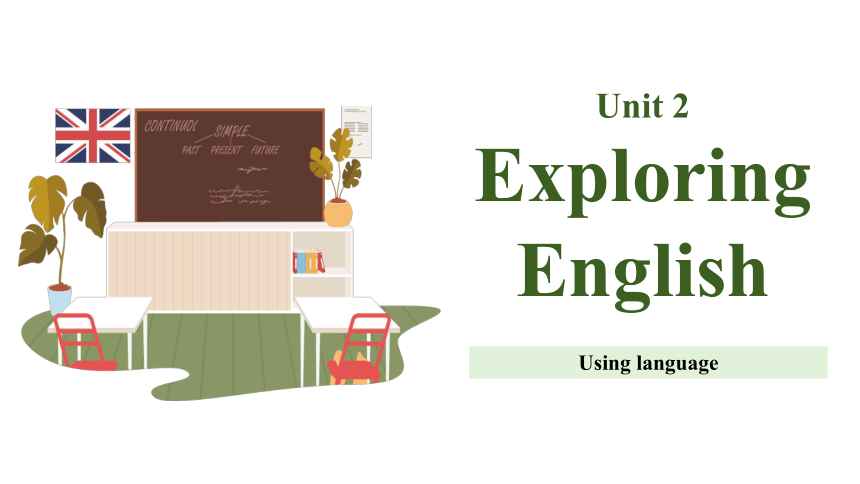 | |
| 格式 | pptx | ||
| 文件大小 | 20.5MB | ||
| 资源类型 | 教案 | ||
| 版本资源 | 外研版(2019) | ||
| 科目 | 英语 | ||
| 更新时间 | 2025-05-22 19:20:55 | ||
图片预览

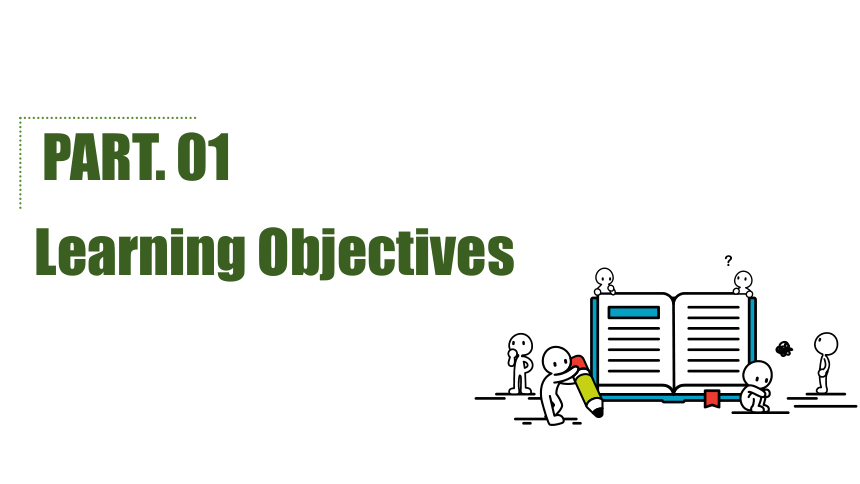
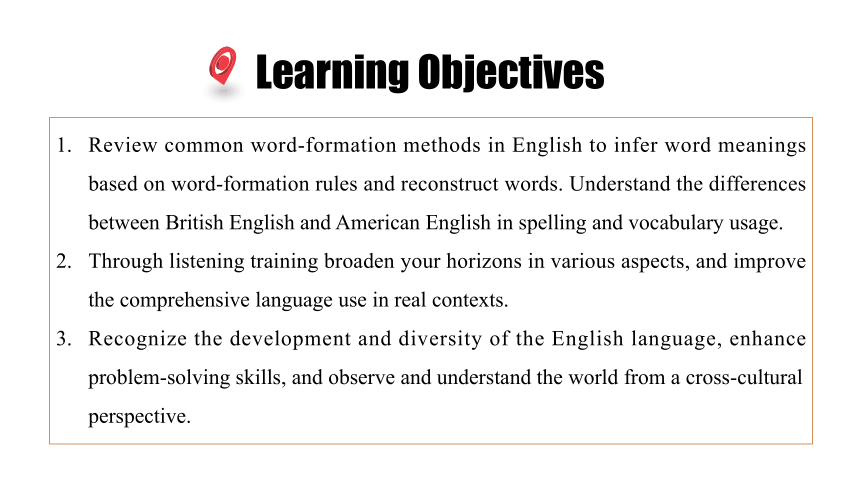
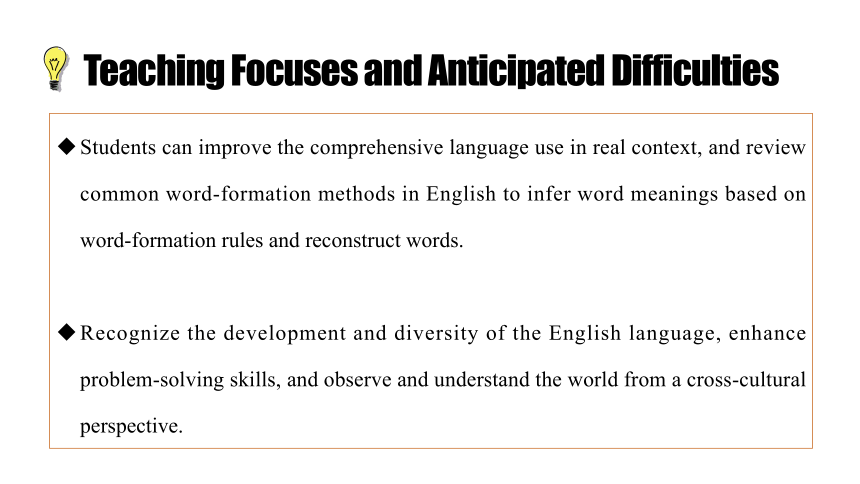

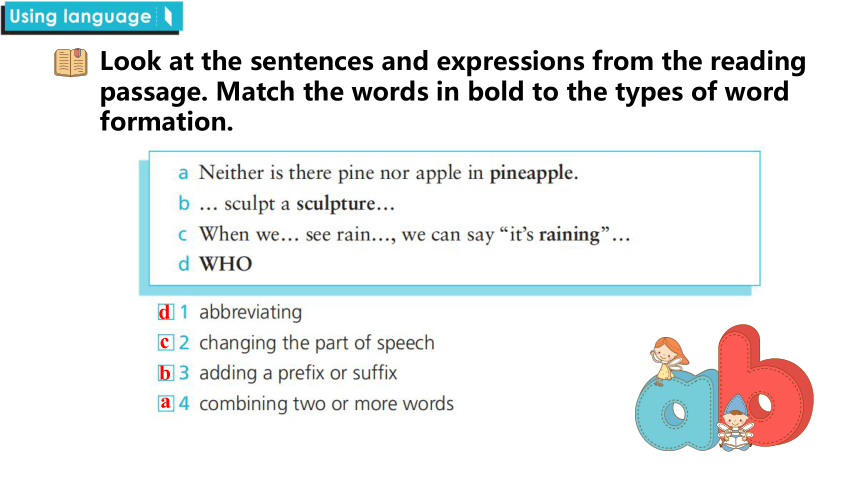
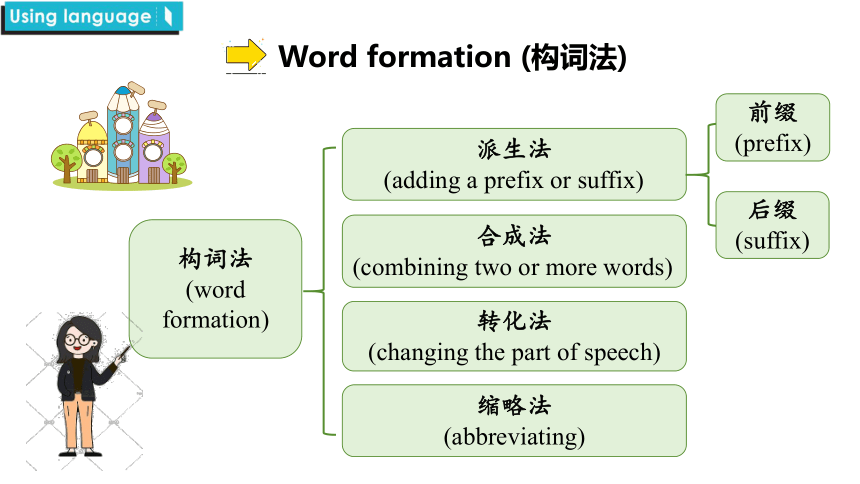

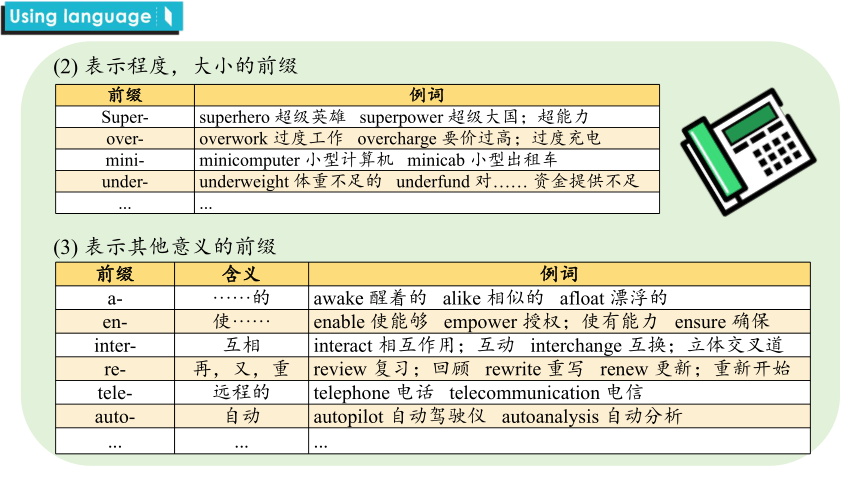
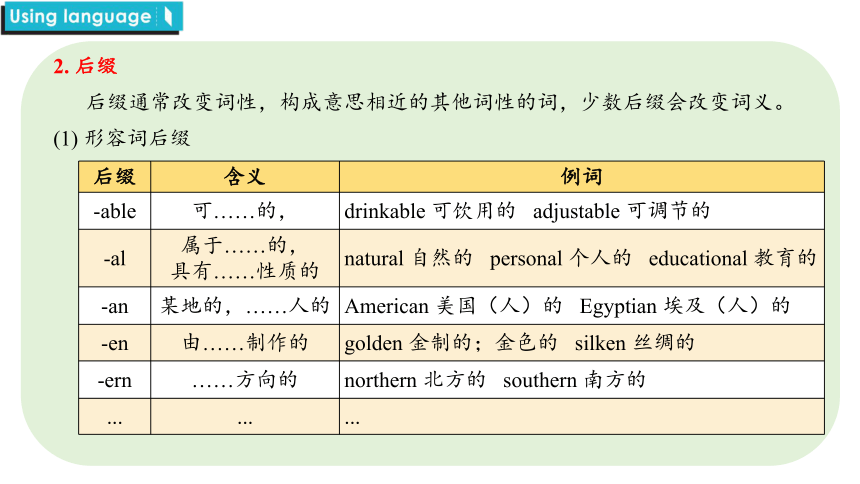
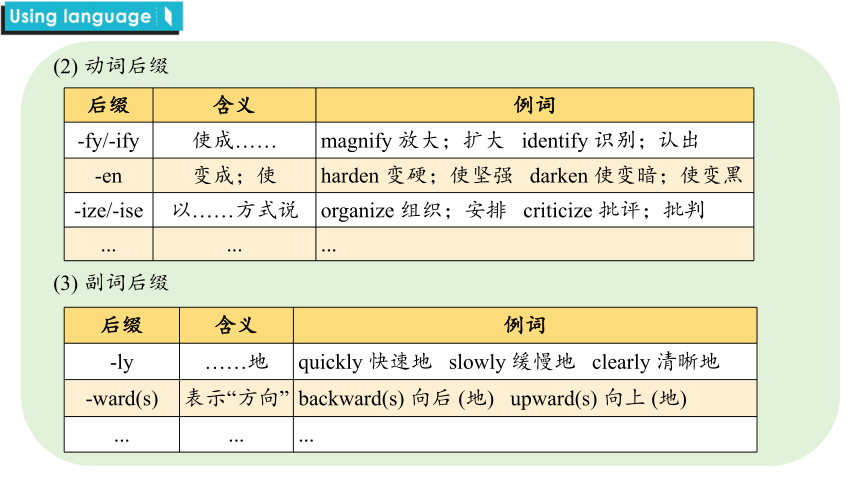
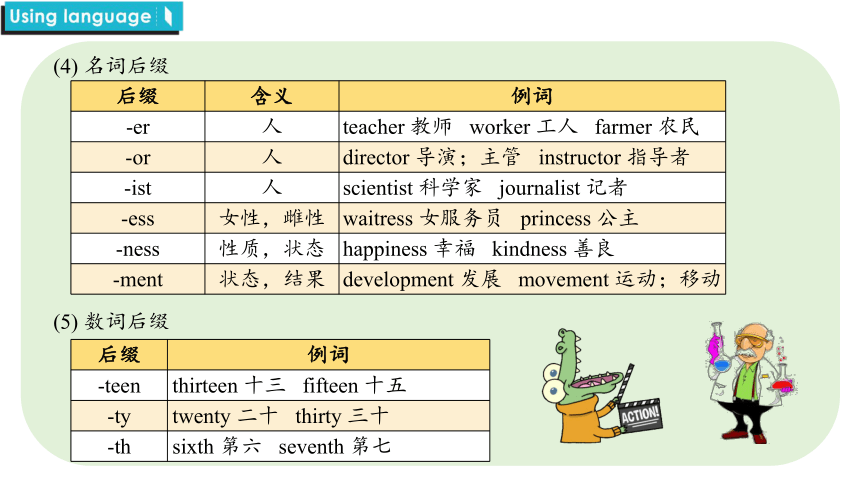
文档简介
(共42张PPT)
Unit 2
Exploring
English
Using language
Learning Objectives
PART. 01
Understand the daily study and life of British middle school students by watching videos. Based on your own daily study and life, compare the study and life in Chinese and British schools, and find out the similarities and differences between the two. Talk about your first impression of high school life, and have a preliminary perception of the study and life in the senior high school stage.
Learning Objectives
Review common word-formation methods in English to infer word meanings based on word-formation rules and reconstruct words. Understand the differences between British English and American English in spelling and vocabulary usage.
Through listening training broaden your horizons in various aspects, and improve the comprehensive language use in real contexts.
Recognize the development and diversity of the English language, enhance problem-solving skills, and observe and understand the world from a cross-cultural perspective.
Understand the daily study and life of British middle school students by watching videos. Based on your own daily study and life, compare the study and life in Chinese and British schools, and find out the similarities and differences between the two. Talk about your first impression of high school life, and have a preliminary perception of the study and life in the senior high school stage.
Teaching Focuses and Anticipated Difficulties
Students can improve the comprehensive language use in real context, and review common word-formation methods in English to infer word meanings based on word-formation rules and reconstruct words.
Recognize the development and diversity of the English language, enhance problem-solving skills, and observe and understand the world from a cross-cultural perspective.
Grammar
PART. 02
Look at the sentences and expressions from the reading passage. Match the words in bold to the types of word formation.
d
c
b
a
Word formation (构词法)
构词法
(word formation)
合成法
(combining two or more words)
派生法
(adding a prefix or suffix)
转化法
(changing the part of speech)
缩略法
(abbreviating)
前缀
(prefix)
后缀
(suffix)
一、派生法
在一个词根的前面或后面加上某个词缀生成一词,这种构词法称为派生法。加在前面的词缀叫前缀,加在后面得叫后缀。
1. 前缀
前缀一般只改变词的意义,不改变词性。
(1) 表示否定意义的前缀
前缀 例词
un- unable 不能的 unhappy 不快乐的 unusual 不寻常的
dis- dishonest 不诚实的 disorder 混乱 disconnect 断开连接
in-/im-/ir-/il- incorrect 不正确的 impolite 不礼貌的 irregular 不规则的 illegal 非法的
non- non-verbal 非言语的 non-fiction 非虚构类 non-payment 未付款
... ...
(2) 表示程度,大小的前缀
(3) 表示其他意义的前缀
前缀 例词
Super- superhero 超级英雄 superpower 超级大国;超能力
over- overwork 过度工作 overcharge 要价过高;过度充电
mini- minicomputer 小型计算机 minicab 小型出租车
under- underweight 体重不足的 underfund 对…… 资金提供不足
... ...
前缀 含义 例词
a- ······的 awake 醒着的 alike 相似的 afloat 漂浮的
en- 使······ enable 使能够 empower 授权;使有能力 ensure 确保
inter- 互相 interact 相互作用;互动 interchange 互换;立体交叉道
re- 再,又,重 review 复习;回顾 rewrite 重写 renew 更新;重新开始
tele- 远程的 telephone 电话 telecommunication 电信
auto- 自动 autopilot 自动驾驶仪 autoanalysis 自动分析
... ... ...
2. 后缀
后缀通常改变词性,构成意思相近的其他词性的词,少数后缀会改变词义。
(1) 形容词后缀
后缀 含义 例词
-able 可……的, drinkable 可饮用的 adjustable 可调节的
-al 属于……的,
具有……性质的 natural 自然的 personal 个人的 educational 教育的
-an 某地的,……人的 American 美国(人)的 Egyptian 埃及(人)的
-en 由……制作的 golden 金制的;金色的 silken 丝绸的
-ern ……方向的 northern 北方的 southern 南方的
... ... ...
(2) 动词后缀
(3) 副词后缀
后缀 含义 例词
-fy/-ify 使成…… magnify 放大;扩大 identify 识别;认出
-en 变成;使 harden 变硬;使坚强 darken 使变暗;使变黑
-ize/-ise 以……方式说 organize 组织;安排 criticize 批评;批判
... ... ...
后缀 含义 例词
-ly ……地 quickly 快速地 slowly 缓慢地 clearly 清晰地
-ward(s) 表示“方向” backward(s) 向后 (地) upward(s) 向上 (地)
... ... ...
(4) 名词后缀
(5) 数词后缀
后缀 含义 例词
-er 人 teacher 教师 worker 工人 farmer 农民
-or 人 director 导演;主管 instructor 指导者
-ist 人 scientist 科学家 journalist 记者
-ess 女性,雌性 waitress 女服务员 princess 公主
-ness 性质,状态 happiness 幸福 kindness 善良
-ment 状态,结果 development 发展 movement 运动;移动
后缀 例词
-teen thirteen 十三 fifteen 十五
-ty twenty 二十 thirty 三十
-th sixth 第六 seventh 第七
二、合成法
把两个或两个以上的词合成一个新词,这种构词法加合成法,由合成法构成的词叫合成词。
1. 合成名词
bookstore 书店、rainbow 彩虹、lighthouse 灯塔、seafood 海鲜、headphones 耳机、notebook 笔记本、classroom 教室、firefighter 消防员、grandmother 祖母、blackboard 黑板、footprint 脚印、lifestyle 生活方式
2. 合成动词
typewrite 打字、brainwash 洗脑、babysit 临时照看婴儿、proofread 校对、waterproof 使防水、air-condition 给…… 装空调、network 将…… 联网;建立关系网、highlight 突出;强调
3. 合成形容词
warm-hearted 热心肠的、long-lasting 持久的、easy-going 随和的、man-made 人造的、state-owned 国有的
4. 合成副词
anyway 无论如何;不管怎样、somewhere 在某处、meanwhile 与此同时
5. 合成介词
inside 在…… 里面、without 没有;不(做某事)、into 到…… 里面;进入
三、转化法
转化法一个单词由一种词性转化为另一种或几种词性,这种构词法称为转化法。
1. 由名词转化为动词
book n. 书 → v. 预订 eye n. 眼睛 → v. 注视
hand n. 手 → v. 传递 ship n. 船 → v. 运输
2. 由动词转化为名词
drive v. 驾驶 → n. 驱动器;车程 attempt v. 尝试 → n. 企图
laugh v. 笑 → n. 笑声 walk v. 走路 → n. 散步
3. 由形容词转化为动词
cool adj. 凉爽的 → v. 使冷却 dry adj. 干燥的 → v. 使干燥
bright adj. 明亮的 → v. 使变亮 sharp adj. 锋利的 → v. 使锋利
4. 由形容词转化为名词
chief adj. 主要的 → n. 首领,负责人 calm adj. 平静的 → n. 平静,安宁
dear adj. 亲爱的 → n. 亲爱的人 disabled adj. 残疾的 → n. [the disabled]残疾人
5. 由副词转化为动词
back adv. 向后 → v. 支持;后退 down adv. 向下 → v. 放下;击败
forward adv. 向前 → v. 推进;发送 up adv. 向上 → v. 提高;建造
6. 由名词或数词转化为副词
town n. 城镇 → adv. 进城;在城里 side n. 边 → adv. 在旁边;侧面地
second num. 第二 → adv. 其次,第二 east n. 东方 → adv. 向东
7. 由形容词转化为副词
fast adj. 快的 → adv. 快速地 hard adj. 硬的;努力的 → adv. 努力地;猛烈地
late adj. 晚的 → adv. 晚地,迟地 straight adj. 直的 → adv. 直接地;笔直地
四、缩略法
是指把两个或两个以上的词各取一部分(或用单词首尾字母或用截头取尾的方法)合在一起构成一个新单词。读音主要有两种形式,即各字母分别读音或作为一个单词来读。
very important person → VIP(读字母音)贵宾
television → TV(读字母音)电视
advertisement → ad广告
laboratory → lab实验室
BTW →
VG →
NVM →
By the way 顺便说一下
Very good 很好
Never mind 别担心
Now look for more examples of each type in the reading passage.
abbreviating: IT, US
changing the part of speech: When we ... see ... snow, we can say... “it’s snowing”.
adding a prefix or suffix: paint-painting, hard-hardly, soft-softly, harm-harmless / harmful, shame-shameless / shameful, visible-invisible
combining two or more words: hamburger, eggplant, seasick, airsick, carsick, homesick, homework, housework
Look at the charts and answer the questions.
When you open a dictionary, you often come across a lot of unfamiliar words. You might think this is a bit scary. But many of them are formed using other simpler words. This is called word formation.
Words formed by combining other words are called compounds, for example, 1_________ (a friend that you contact by writing, traditionally using a pen) and 2____________ (known by many people).
Prefixes and suffixes often have fixed meanings. If you add un- or in- to a word, the new word usually means the opposite. For example, if something isn’t correct it’s 3__________, and if someone isn’t happy they are 4_________. Words with the suffixes -ment and -ness are often nouns. For example, if somebody has improved a lot, they have made great 5____________.
Some nouns and adjectives can be used as verbs, or the other way round. When we calm somebody down, they become 6_________. And we can give someone a present by 7__________ it.
And sometimes a word is made up of the first letters of several words: “World Trade Organization ” can be referred to as 8_______, and 9_______ is short for “as soon as possible”.
It is impossible to know the meaning of every word, but knowing about word formation can help us guess their meanings.
penfriend
well-known
incorrect
unhappy
improvement
calm
presenting
WTO
ASAP
Work in groups. Choose one type and come up with as many words as possible.
Group A
unlike, dislike, likely,
likelihood
like
Group B
unlike, dislike, likeness, likely, liking, unlikely
Group B is the winner.
Watch a video and a picture, and feel the differences that between American English and British English.
Look at the pictures and get to know American English words and British equivalents.
American English: subway, highway, theater, gas, apartment, elevator
British English: underground, motorway, theatre, petrol, flat, lift
Now Complete the passage with the words above.
Today, American English is in common international use. It is different from British English in several ways, mostly in spelling and vocabulary. Some American spellings were created by Noah Webster, who made one of America’s first dictionaries. He changed “-re” spellings to “er”, which is why 1_______ is spelt 2________ in American English.
The Americans and the British also use different words for everyday things. For example, Americans talk about putting 3______ in their cars and driving along the 4________, whereas in the UK, people put 5______ in their cars and drive along the 6__________.
Americans take the 7________ to the top floor of a building, but the British use the 8_____. In the US, they take the 9_______, but in the UK, people travel on the 10____________. Americans live in a(n) 11__________, while the British live in a(n) 12_____.
It’s not as confusing as it seems: usually people from the two countries can understand each other from the context. But that doesn’t stop them having a friendly argument about which word is the “right” one!
subway/underground highway/motorway theater/theatre gas/petrol apartment/flat elevator/lift
theatre
theater
gas
highway
petrol
motorway
elevator
lift
subway
underground
apartment
flat
Work in pairs. Find more examples of differences between American and British English. Use a dictionary or search on the Internet.
Spelling
Vocabulary
Pronunciation
Listening
PART. 03
Each year, many additions are made to English dictionaries. Recent additions include “selfie” (a photograph that you take of yourself, usually with a mobile phone) and “netizen” (a citizen who uses the Internet).
Some messaging abbreviations have also been added, for example, BRB (be right back), COZ (because) and G2G (got to go).
Did You Know
Listen to three conversations and match them to the pictures.
Conversation 3
Conversation 1
Conversation 2
Listen again and complete the table.
Words Meaning Origin
dim sum a kind of traditional 1 _______________ from 2 ____________________
3 _________ using a cellphone without caring about others a combination of the words 4 _________ and 5 _________
6 _________ a shorter way of saying 7 ___________________ from the Internet
Chinese food
the Guangdong dialect
cellfish
cellphone
selfish
LOL
“laugh out loud”
Now talk about how the speakers ask for and explain the meanings of the words.
Work in pairs. Act out the conversation to ask for and explain the meanings of the expressions.
student A
Situation 1:
You are a waiter / waitress in a restaurant. You ask your customer whether he / she needs a doggy bag.
(Note: A “doggy bag” is a bag or box in which you take unfinished food home from a restaurant.)
Situation 2:
You see a sign in a supermarket saying “3 for 2”. You don’t know what it means and ask the shop assistant to explain.
Work in pairs. Act out the conversation to ask for and explain the meanings of the expressions.
student B
Situation 1:
You are asking for the bill in a restaurant. The waiter / waitress asks you if you need a doggy bag. You don’t know what it is and ask him / her to explain.
Situation 2:
You are a shop assistant. A customer asks you what “3 for 2” means. (Note: “3 for 2” means that if you buy two items, you get a third one for free.)
Work in pairs. Find more words and their meanings on the Internet, and have a similar conversation.
Vocabulary
1. come across
come about 发生,产生(常与how 连用)
come on 登台;发展;得了吧;赶快;加把劲
come to 总共;达到(其状况);(昏迷后)醒来
come out 出版;出现;开花
come true 实现;成为现实(不用于被动语态)
come along 出现,来到;(和某人)一起去
come up 走近,靠近;被提及,被讨论(不用于被动语态)
come up with 想出(主意),想到(答案等)
例题:Her lifelong dream of becoming a doctor finally came _______.
true
Vocabulary
2. contact
be in contact with sb. 与某人有联系
stay/keep in contact with sb. 某人保持联系
lose contact with sb. 与某人失去联系
make contact with sb.=get in contact with sb. 与某人人取得联系
例题:
I’ve tried hard not to lose contact _____ my family while studying overseas.
I try to _________ in contact with my college roommates through weekly video calls.
with
stay/keep
Vocabulary
3. addition
in addition 除此之外,此外
in addition to 除……之外(还)
例题:
The team not only won the game but also gained valuable experience. ____________, their performance inspired fans.
________________ his regular job, he volunteers at a local shelter every weekend.
In addition
In addition to
Exercise
PART. 04
1. Stepping into an u_________(不熟悉的) city alone can be both exciting and daunting.
2. To understand the meaning of a word, it’s essential to look at its c________(上下文) in the sentence.
3. A balanced diet and regular exercise make it more l______(可能的) for people to stay healthy.
4. The embassy advised citizens to c_______(联系) them immediately in case of an emergency.
5. This bookstore has every t______(类型) of novel, from sci-fi to romance.
nfamiliar
Exercise: 单词拼写
ontext
ikely
ontact
ype
1. A ____________(combine) of hard work and luck is necessary to achieve success.
2. The United Nations is an international ___________(organize) dedicated to promoting peace and cooperation.
3. The storm made the dark sky look ______(scare), with lightning flashing every few seconds.
4. The __________(form) of public opinion is influenced by media, education, and personal experiences.
5. The hotel offers ___________(addition) services like airport pickup and room service.
combination
Exercise: 用所给词的适当形式填空
organization
scary
formation
additional
Summary
PART. 05
Using language
Grammar
Vocabulary
Listening
构词法
派生法
转化法
合成法
缩略法
Homework
PART. 06
单击标题内容
详细内容……点击输入本栏的具体文字,简明扼要的说明分项内容。点击输入本栏的具体文字,详细内容……点击输入本栏的具体文字,简明扼要的说明分项内容。点击输入本栏的具体文字,详细内容……点击输入本栏的具体文字,简明扼要的说明分项内容。点击输入本栏的具体文字,
单击标题内容
详细内容……点击输入本栏的具体文字,简明扼要的说明分项内容。点击输入本栏的具体文字,详细内容……点击输入本栏的具体文字,简明扼要的说明分项内容。点击输入本栏的具体文字,详细内容……点击输入本栏的具体文字,简明扼要的说明分项内容。点击输入本栏的具体文字,
59%
Review what you have learnt in this class;
Find new words and their meanings on the Internet.
Homework
See you next class!
Unit 2
Exploring
English
Using language
Learning Objectives
PART. 01
Understand the daily study and life of British middle school students by watching videos. Based on your own daily study and life, compare the study and life in Chinese and British schools, and find out the similarities and differences between the two. Talk about your first impression of high school life, and have a preliminary perception of the study and life in the senior high school stage.
Learning Objectives
Review common word-formation methods in English to infer word meanings based on word-formation rules and reconstruct words. Understand the differences between British English and American English in spelling and vocabulary usage.
Through listening training broaden your horizons in various aspects, and improve the comprehensive language use in real contexts.
Recognize the development and diversity of the English language, enhance problem-solving skills, and observe and understand the world from a cross-cultural perspective.
Understand the daily study and life of British middle school students by watching videos. Based on your own daily study and life, compare the study and life in Chinese and British schools, and find out the similarities and differences between the two. Talk about your first impression of high school life, and have a preliminary perception of the study and life in the senior high school stage.
Teaching Focuses and Anticipated Difficulties
Students can improve the comprehensive language use in real context, and review common word-formation methods in English to infer word meanings based on word-formation rules and reconstruct words.
Recognize the development and diversity of the English language, enhance problem-solving skills, and observe and understand the world from a cross-cultural perspective.
Grammar
PART. 02
Look at the sentences and expressions from the reading passage. Match the words in bold to the types of word formation.
d
c
b
a
Word formation (构词法)
构词法
(word formation)
合成法
(combining two or more words)
派生法
(adding a prefix or suffix)
转化法
(changing the part of speech)
缩略法
(abbreviating)
前缀
(prefix)
后缀
(suffix)
一、派生法
在一个词根的前面或后面加上某个词缀生成一词,这种构词法称为派生法。加在前面的词缀叫前缀,加在后面得叫后缀。
1. 前缀
前缀一般只改变词的意义,不改变词性。
(1) 表示否定意义的前缀
前缀 例词
un- unable 不能的 unhappy 不快乐的 unusual 不寻常的
dis- dishonest 不诚实的 disorder 混乱 disconnect 断开连接
in-/im-/ir-/il- incorrect 不正确的 impolite 不礼貌的 irregular 不规则的 illegal 非法的
non- non-verbal 非言语的 non-fiction 非虚构类 non-payment 未付款
... ...
(2) 表示程度,大小的前缀
(3) 表示其他意义的前缀
前缀 例词
Super- superhero 超级英雄 superpower 超级大国;超能力
over- overwork 过度工作 overcharge 要价过高;过度充电
mini- minicomputer 小型计算机 minicab 小型出租车
under- underweight 体重不足的 underfund 对…… 资金提供不足
... ...
前缀 含义 例词
a- ······的 awake 醒着的 alike 相似的 afloat 漂浮的
en- 使······ enable 使能够 empower 授权;使有能力 ensure 确保
inter- 互相 interact 相互作用;互动 interchange 互换;立体交叉道
re- 再,又,重 review 复习;回顾 rewrite 重写 renew 更新;重新开始
tele- 远程的 telephone 电话 telecommunication 电信
auto- 自动 autopilot 自动驾驶仪 autoanalysis 自动分析
... ... ...
2. 后缀
后缀通常改变词性,构成意思相近的其他词性的词,少数后缀会改变词义。
(1) 形容词后缀
后缀 含义 例词
-able 可……的, drinkable 可饮用的 adjustable 可调节的
-al 属于……的,
具有……性质的 natural 自然的 personal 个人的 educational 教育的
-an 某地的,……人的 American 美国(人)的 Egyptian 埃及(人)的
-en 由……制作的 golden 金制的;金色的 silken 丝绸的
-ern ……方向的 northern 北方的 southern 南方的
... ... ...
(2) 动词后缀
(3) 副词后缀
后缀 含义 例词
-fy/-ify 使成…… magnify 放大;扩大 identify 识别;认出
-en 变成;使 harden 变硬;使坚强 darken 使变暗;使变黑
-ize/-ise 以……方式说 organize 组织;安排 criticize 批评;批判
... ... ...
后缀 含义 例词
-ly ……地 quickly 快速地 slowly 缓慢地 clearly 清晰地
-ward(s) 表示“方向” backward(s) 向后 (地) upward(s) 向上 (地)
... ... ...
(4) 名词后缀
(5) 数词后缀
后缀 含义 例词
-er 人 teacher 教师 worker 工人 farmer 农民
-or 人 director 导演;主管 instructor 指导者
-ist 人 scientist 科学家 journalist 记者
-ess 女性,雌性 waitress 女服务员 princess 公主
-ness 性质,状态 happiness 幸福 kindness 善良
-ment 状态,结果 development 发展 movement 运动;移动
后缀 例词
-teen thirteen 十三 fifteen 十五
-ty twenty 二十 thirty 三十
-th sixth 第六 seventh 第七
二、合成法
把两个或两个以上的词合成一个新词,这种构词法加合成法,由合成法构成的词叫合成词。
1. 合成名词
bookstore 书店、rainbow 彩虹、lighthouse 灯塔、seafood 海鲜、headphones 耳机、notebook 笔记本、classroom 教室、firefighter 消防员、grandmother 祖母、blackboard 黑板、footprint 脚印、lifestyle 生活方式
2. 合成动词
typewrite 打字、brainwash 洗脑、babysit 临时照看婴儿、proofread 校对、waterproof 使防水、air-condition 给…… 装空调、network 将…… 联网;建立关系网、highlight 突出;强调
3. 合成形容词
warm-hearted 热心肠的、long-lasting 持久的、easy-going 随和的、man-made 人造的、state-owned 国有的
4. 合成副词
anyway 无论如何;不管怎样、somewhere 在某处、meanwhile 与此同时
5. 合成介词
inside 在…… 里面、without 没有;不(做某事)、into 到…… 里面;进入
三、转化法
转化法一个单词由一种词性转化为另一种或几种词性,这种构词法称为转化法。
1. 由名词转化为动词
book n. 书 → v. 预订 eye n. 眼睛 → v. 注视
hand n. 手 → v. 传递 ship n. 船 → v. 运输
2. 由动词转化为名词
drive v. 驾驶 → n. 驱动器;车程 attempt v. 尝试 → n. 企图
laugh v. 笑 → n. 笑声 walk v. 走路 → n. 散步
3. 由形容词转化为动词
cool adj. 凉爽的 → v. 使冷却 dry adj. 干燥的 → v. 使干燥
bright adj. 明亮的 → v. 使变亮 sharp adj. 锋利的 → v. 使锋利
4. 由形容词转化为名词
chief adj. 主要的 → n. 首领,负责人 calm adj. 平静的 → n. 平静,安宁
dear adj. 亲爱的 → n. 亲爱的人 disabled adj. 残疾的 → n. [the disabled]残疾人
5. 由副词转化为动词
back adv. 向后 → v. 支持;后退 down adv. 向下 → v. 放下;击败
forward adv. 向前 → v. 推进;发送 up adv. 向上 → v. 提高;建造
6. 由名词或数词转化为副词
town n. 城镇 → adv. 进城;在城里 side n. 边 → adv. 在旁边;侧面地
second num. 第二 → adv. 其次,第二 east n. 东方 → adv. 向东
7. 由形容词转化为副词
fast adj. 快的 → adv. 快速地 hard adj. 硬的;努力的 → adv. 努力地;猛烈地
late adj. 晚的 → adv. 晚地,迟地 straight adj. 直的 → adv. 直接地;笔直地
四、缩略法
是指把两个或两个以上的词各取一部分(或用单词首尾字母或用截头取尾的方法)合在一起构成一个新单词。读音主要有两种形式,即各字母分别读音或作为一个单词来读。
very important person → VIP(读字母音)贵宾
television → TV(读字母音)电视
advertisement → ad广告
laboratory → lab实验室
BTW →
VG →
NVM →
By the way 顺便说一下
Very good 很好
Never mind 别担心
Now look for more examples of each type in the reading passage.
abbreviating: IT, US
changing the part of speech: When we ... see ... snow, we can say... “it’s snowing”.
adding a prefix or suffix: paint-painting, hard-hardly, soft-softly, harm-harmless / harmful, shame-shameless / shameful, visible-invisible
combining two or more words: hamburger, eggplant, seasick, airsick, carsick, homesick, homework, housework
Look at the charts and answer the questions.
When you open a dictionary, you often come across a lot of unfamiliar words. You might think this is a bit scary. But many of them are formed using other simpler words. This is called word formation.
Words formed by combining other words are called compounds, for example, 1_________ (a friend that you contact by writing, traditionally using a pen) and 2____________ (known by many people).
Prefixes and suffixes often have fixed meanings. If you add un- or in- to a word, the new word usually means the opposite. For example, if something isn’t correct it’s 3__________, and if someone isn’t happy they are 4_________. Words with the suffixes -ment and -ness are often nouns. For example, if somebody has improved a lot, they have made great 5____________.
Some nouns and adjectives can be used as verbs, or the other way round. When we calm somebody down, they become 6_________. And we can give someone a present by 7__________ it.
And sometimes a word is made up of the first letters of several words: “World Trade Organization ” can be referred to as 8_______, and 9_______ is short for “as soon as possible”.
It is impossible to know the meaning of every word, but knowing about word formation can help us guess their meanings.
penfriend
well-known
incorrect
unhappy
improvement
calm
presenting
WTO
ASAP
Work in groups. Choose one type and come up with as many words as possible.
Group A
unlike, dislike, likely,
likelihood
like
Group B
unlike, dislike, likeness, likely, liking, unlikely
Group B is the winner.
Watch a video and a picture, and feel the differences that between American English and British English.
Look at the pictures and get to know American English words and British equivalents.
American English: subway, highway, theater, gas, apartment, elevator
British English: underground, motorway, theatre, petrol, flat, lift
Now Complete the passage with the words above.
Today, American English is in common international use. It is different from British English in several ways, mostly in spelling and vocabulary. Some American spellings were created by Noah Webster, who made one of America’s first dictionaries. He changed “-re” spellings to “er”, which is why 1_______ is spelt 2________ in American English.
The Americans and the British also use different words for everyday things. For example, Americans talk about putting 3______ in their cars and driving along the 4________, whereas in the UK, people put 5______ in their cars and drive along the 6__________.
Americans take the 7________ to the top floor of a building, but the British use the 8_____. In the US, they take the 9_______, but in the UK, people travel on the 10____________. Americans live in a(n) 11__________, while the British live in a(n) 12_____.
It’s not as confusing as it seems: usually people from the two countries can understand each other from the context. But that doesn’t stop them having a friendly argument about which word is the “right” one!
subway/underground highway/motorway theater/theatre gas/petrol apartment/flat elevator/lift
theatre
theater
gas
highway
petrol
motorway
elevator
lift
subway
underground
apartment
flat
Work in pairs. Find more examples of differences between American and British English. Use a dictionary or search on the Internet.
Spelling
Vocabulary
Pronunciation
Listening
PART. 03
Each year, many additions are made to English dictionaries. Recent additions include “selfie” (a photograph that you take of yourself, usually with a mobile phone) and “netizen” (a citizen who uses the Internet).
Some messaging abbreviations have also been added, for example, BRB (be right back), COZ (because) and G2G (got to go).
Did You Know
Listen to three conversations and match them to the pictures.
Conversation 3
Conversation 1
Conversation 2
Listen again and complete the table.
Words Meaning Origin
dim sum a kind of traditional 1 _______________ from 2 ____________________
3 _________ using a cellphone without caring about others a combination of the words 4 _________ and 5 _________
6 _________ a shorter way of saying 7 ___________________ from the Internet
Chinese food
the Guangdong dialect
cellfish
cellphone
selfish
LOL
“laugh out loud”
Now talk about how the speakers ask for and explain the meanings of the words.
Work in pairs. Act out the conversation to ask for and explain the meanings of the expressions.
student A
Situation 1:
You are a waiter / waitress in a restaurant. You ask your customer whether he / she needs a doggy bag.
(Note: A “doggy bag” is a bag or box in which you take unfinished food home from a restaurant.)
Situation 2:
You see a sign in a supermarket saying “3 for 2”. You don’t know what it means and ask the shop assistant to explain.
Work in pairs. Act out the conversation to ask for and explain the meanings of the expressions.
student B
Situation 1:
You are asking for the bill in a restaurant. The waiter / waitress asks you if you need a doggy bag. You don’t know what it is and ask him / her to explain.
Situation 2:
You are a shop assistant. A customer asks you what “3 for 2” means. (Note: “3 for 2” means that if you buy two items, you get a third one for free.)
Work in pairs. Find more words and their meanings on the Internet, and have a similar conversation.
Vocabulary
1. come across
come about 发生,产生(常与how 连用)
come on 登台;发展;得了吧;赶快;加把劲
come to 总共;达到(其状况);(昏迷后)醒来
come out 出版;出现;开花
come true 实现;成为现实(不用于被动语态)
come along 出现,来到;(和某人)一起去
come up 走近,靠近;被提及,被讨论(不用于被动语态)
come up with 想出(主意),想到(答案等)
例题:Her lifelong dream of becoming a doctor finally came _______.
true
Vocabulary
2. contact
be in contact with sb. 与某人有联系
stay/keep in contact with sb. 某人保持联系
lose contact with sb. 与某人失去联系
make contact with sb.=get in contact with sb. 与某人人取得联系
例题:
I’ve tried hard not to lose contact _____ my family while studying overseas.
I try to _________ in contact with my college roommates through weekly video calls.
with
stay/keep
Vocabulary
3. addition
in addition 除此之外,此外
in addition to 除……之外(还)
例题:
The team not only won the game but also gained valuable experience. ____________, their performance inspired fans.
________________ his regular job, he volunteers at a local shelter every weekend.
In addition
In addition to
Exercise
PART. 04
1. Stepping into an u_________(不熟悉的) city alone can be both exciting and daunting.
2. To understand the meaning of a word, it’s essential to look at its c________(上下文) in the sentence.
3. A balanced diet and regular exercise make it more l______(可能的) for people to stay healthy.
4. The embassy advised citizens to c_______(联系) them immediately in case of an emergency.
5. This bookstore has every t______(类型) of novel, from sci-fi to romance.
nfamiliar
Exercise: 单词拼写
ontext
ikely
ontact
ype
1. A ____________(combine) of hard work and luck is necessary to achieve success.
2. The United Nations is an international ___________(organize) dedicated to promoting peace and cooperation.
3. The storm made the dark sky look ______(scare), with lightning flashing every few seconds.
4. The __________(form) of public opinion is influenced by media, education, and personal experiences.
5. The hotel offers ___________(addition) services like airport pickup and room service.
combination
Exercise: 用所给词的适当形式填空
organization
scary
formation
additional
Summary
PART. 05
Using language
Grammar
Vocabulary
Listening
构词法
派生法
转化法
合成法
缩略法
Homework
PART. 06
单击标题内容
详细内容……点击输入本栏的具体文字,简明扼要的说明分项内容。点击输入本栏的具体文字,详细内容……点击输入本栏的具体文字,简明扼要的说明分项内容。点击输入本栏的具体文字,详细内容……点击输入本栏的具体文字,简明扼要的说明分项内容。点击输入本栏的具体文字,
单击标题内容
详细内容……点击输入本栏的具体文字,简明扼要的说明分项内容。点击输入本栏的具体文字,详细内容……点击输入本栏的具体文字,简明扼要的说明分项内容。点击输入本栏的具体文字,详细内容……点击输入本栏的具体文字,简明扼要的说明分项内容。点击输入本栏的具体文字,
59%
Review what you have learnt in this class;
Find new words and their meanings on the Internet.
Homework
See you next class!
